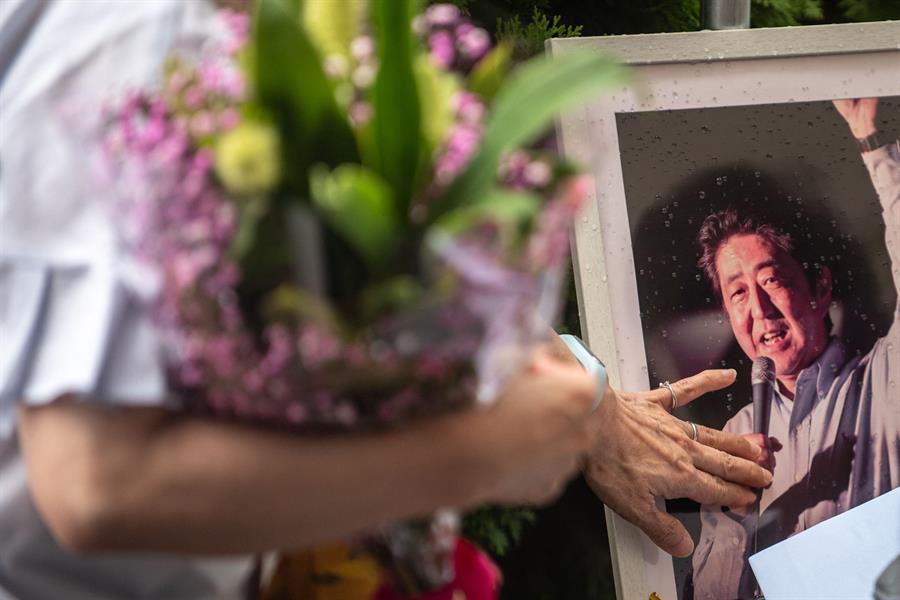
A hearse carrying the body of assassinated former prime minister Shinzo Abe arrived in Tokyo on July 9 from the western Japanese city where he was shot at close range on the campaign trail.
The murder of Japan’s best-known politician rattled the country and sent shockwaves around the world, particularly given the nation’s low levels of violent crime and strict gun laws.
AFP journalists saw the vehicle enter Abe’s residence in the capital, while senior members of his ruling Liberal Democratic Party, dressed in black, lined up to pay their respects.
The man accused of Friday’s shooting is in custody, with police saying he had confessed to killing the former premier, motivated by a belief Abe was linked to an unspecified organisation.
Police were investigating the unemployed 41-year-old’s background, including claims he had served in Japan’s navy, and said he appeared to have used a handmade gun.
Abe was delivering a speech in Nara ahead of Sunday’s upper house elections when he was shot, and campaigning resumed Saturday with politicians saying they were determined to show democracy would prevail.
"We absolutely must not tolerate violence during an election to suppress speech," Prime Minister Fumio Kishida told around 600 supporters in central Japan’s Yamanashi region, according to the Yomiuri Shimbun newspaper.
The Yomiuri and other Japanese media at Kishida’s first campaign event since the assassination described a tense mood and high levels of security, with a metal fence put up to separate the leader from the crowd.
Doctors said Friday that Abe showed no vital signs when he arrived and died of enormous blood loss, despite massive transfusions.
They described multiple wounds to the politician’s neck, with the internal damage reaching as deep as his heart.
Abe’s murder shook Japan, with Kishida describing the killing as a "barbaric act" that was "unforgivable".
Kishida was visibly emotional after the former leader’s death was confirmed, saying he was "lost for words", and is expected to visit Abe’s Tokyo residence on Saturday to pay his respects.
International reaction was similarly stark, with US President Joe Biden saying he was "stunned, outraged and deeply saddened", and ordering flags on US government buildings to fly at half-mast.
Australia announced that the Sydney Opera House would be lit up on Sunday in tribute to Abe.
Even regional powers with whom Abe had clashed expressed condolences. South Korea’s president called the killing an "unacceptable act", and the Chinese embassy in Japan praised Abe’s "contribution to the improvement and development" of ties.
Investigators were still piecing together a picture of the man behind the assassination and his motives.
He has been identified as Tetsuya Yamagami, and police said Friday he admitted to targeting Abe over a grudge against an organisation he believed the former leader was linked to.
They have declined to name the organisation, though Japanese media outlets described it as a religious group.
The gun he used "is clearly handmade in appearance", investigators said, and several other apparently handmade weapons were uncovered by police in protective gear who raided Yamagami’s home on Friday.
The suspect, who has been arrested on suspicion of murder, opened fire on Abe shortly before noon on Friday.
Footage from public broadcaster NHK showed Yamagami, dressed in a grey shirt and brown trousers, approaching from behind before drawing a weapon from a bag.
At least two shots appeared to be fired, each producing a cloud of smoke. As spectators and reporters ducked, he was tackled to the ground by security.
Japanese media reported that a wake would be held Monday evening and a funeral on Tuesday for Abe’s close family and associates.
On Friday night and Saturday morning, a steady stream of mourners came to lay flowers and pray for Abe, who had been Japan’s longest-serving prime minister.
"I just couldn’t sit back and do nothing. I had to come," said Nara resident Sachie Nagafuji, 54, visiting the scene with his son.
Abe was the scion of a political family and became the country’s youngest post-war prime minister when he took power for the first time in 2006, aged 52.
His turbulent first term ended in resignation for health reasons, but he returned to power in 2012 and stayed in office until the return of his ulcerative colitis forced a second resignation in 2020.
His hawkish, nationalist views were divisive, particularly his desire to reform the country’s pacifist constitution to recognise the country’s military, and he weathered a series of scandals, including allegations of cronyism.
But he was lauded by others for his economic strategy, dubbed "Abenomics" and his efforts to put Japan firmly on the world stage, including by cultivating close ties with US president Donald Trump.